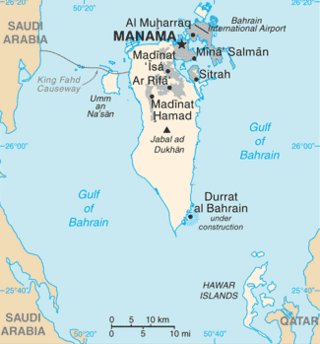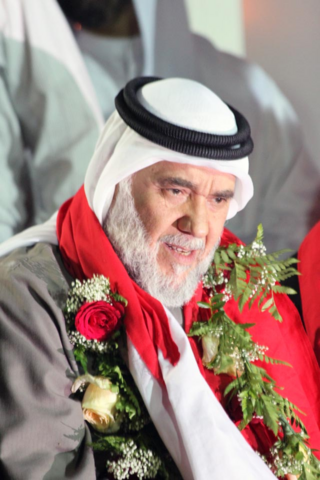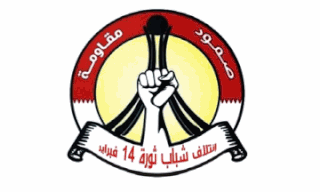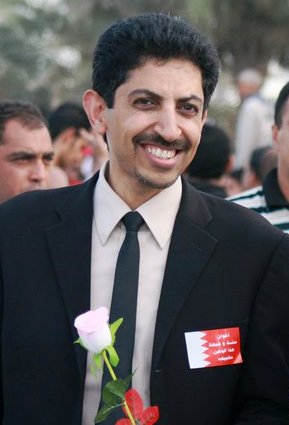
Hamad bin Isa bin Salman Al Khalifa is King of Bahrain since 14 February 2002, after ruling as Emir of Bahrain from 6 March 1999. He is the son of Isa bin Salman Al Khalifa, the previous and first emir. The country has been ruled by the Al Khalifa dynasty since 1783.

The 1990s uprising in Bahrain also known as the uprising of dignity was an uprising in Bahrain between 1994 and 1999 in which leftists, liberals and Islamists joined forces to demand democratic reforms. The uprising caused approximately forty deaths and ended after Hamad bin Isa Al Khalifa became the Emir of Bahrain in 1999 and a referendum on 14–15 February 2001 massively supported the National Action Charter. The uprising resulted in the deaths of around 40 civilians and at least one Bahraini soldier.
The Troubles were a period of conflict in Northern Ireland involving republican and loyalist paramilitaries, the British security forces and civilians. They are usually dated from the late 1960s to the Good Friday Agreement of 1998. However, sporadic violence has occurred since that time, with those involved often being referred to as "dissident republicans and loyalists". The Troubles, sometimes known internationally as the Northern Ireland conflict, claimed roughly 3500 lives.

Hasan Mushaima is an opposition leader in Bahrain and the secretary-general of the Haq Movement, an important opposition party in Bahrain. Before forming Haq, he was a founding member of Al Wefaq and a leading figure in the 1994 uprising in Bahrain. He has campaigned for more democratic rights in Bahrain and has been in prison in Bahrain since his arrest in 2011.

Bahrain, officially the Kingdom of Bahrain, is an island country in West Asia. It is situated on the Persian Gulf, and comprises a small archipelago made up of 50 natural islands and an additional 33 artificial islands, centered on Bahrain Island which makes up around 83 percent of the country's landmass. Bahrain is situated between Qatar and the northeastern coast of Saudi Arabia, to which it is connected by the King Fahd Causeway. The population of Bahrain is 1,501,635 as of 14 May 2023, based on elaborations of the United Nations data, of whom 712,362 are Bahraini nationals. Bahrain spans some 760 square kilometres (290 sq mi), and is the third-smallest nation in Asia after the Maldives and Singapore. The capital and largest city is Manama.

The Arab Spring or the First Arab Spring was a series of anti-government protests, uprisings and armed rebellions that spread across much of the Arab world in the early 2010s. It began in Tunisia in response to corruption and economic stagnation. From Tunisia, the protests then spread to five other countries: Libya, Egypt, Yemen, Syria and Bahrain. Rulers were deposed or major uprisings and social violence occurred including riots, civil wars, or insurgencies. Sustained street demonstrations took place in Morocco, Iraq, Algeria, Lebanon, Jordan, Kuwait, Oman and Sudan. Minor protests took place in Djibouti, Mauritania, Palestine, Saudi Arabia and the Western Sahara. A major slogan of the demonstrators in the Arab world is ash-shaʻb yurīd isqāṭ an-niẓām!.

The 2011Bahraini uprising was a series of anti-government protests in Bahrain led by the Shia-dominant and some Sunni minority Bahraini opposition from 2011 until 2014. The protests were inspired by the unrest of the 2011 Arab Spring and protests in Tunisia and Egypt and escalated to daily clashes after the Bahraini government repressed the revolt with the support of the Gulf Cooperation Council and Peninsula Shield Force. The Bahraini protests were a series of demonstrations, amounting to a sustained campaign of non-violent civil disobedience and some violent resistance in the Persian Gulf country of Bahrain. As part of the revolutionary wave of protests in the Middle East and North Africa following the self-immolation of Mohamed Bouazizi in Tunisia, the Bahraini protests were initially aimed at achieving greater political freedom and equality for the 70% Shia population.

Nabeel Rajab is a Bahraini human rights activist and opposition figure. He is the president of the Bahrain Centre for Human Rights (BCHR), a member of the Advisory Committee of Human Rights Watch's Middle East Division, deputy secretary general for the International Federation for Human Rights (FIDH), member of the Advisory Board of the Bahrain Rehabilitation and Anti-Violence Organization (BRAVO), co-founder of the Gulf Centre for Human Rights (GCHR), and former chairman of CARAM Asia.
The international reactions to the 2011 Bahraini uprising include responses by supranational organisations, non-governmental organisations, media organisations, and both the governments and civil populaces, like of fellow sovereign states to the protests and uprising in Bahrain during the Arab Spring. The small island nation's territorial position in the Persian Gulf not only makes it a key contending regional power but also determines its geostrategic position as a buffer between the Arab World and Iran. Hence, the geostrategic implications aid in explaining international responses to the uprising in Bahrain. Accordingly, as a proxy state between Saudi Arabia and Iran, Bahrain's domestic politics is both wittingly and unavoidably shaped by regional forces and variables that determine the country's response to internal and external pressures.

Coalition Youth of 14 Feb Revolution, sometimes called The Coalition is a Bahraini youth group, named after the date of the beginning of Bahrain's uprising, and led by anonymous individuals who organize protests chiefly via new-media sites. The Coalition first appeared on the popular pro-democracy forum Bahrain Online. Their Facebook page started in April 2011 where they have 65,282 likes. It is the main Facebook page that calls for daily peaceful demonstrations and protests. One of the first sub-groups called February 14 Youth was behind the call for demonstrations on February 14, 2011, named "Day of Rage" and developed later to a nationwide uprising. in 2017, the group has been designated as a terrorist organization by Bahrain, Saudi Arabia, United Arab Emirates and Egypt.
A timeline of the Yemeni revolution spans the following four articles related to the Yemeni revolution:
Many human rights reports were published about the Bahraini uprising of 2011, a campaign of protests, and civil disobedience in the Persian Gulf state of Bahrain that is considered part of the revolutionary wave of protests dubbed the Arab Spring. At least 14 human rights reports were issued by 18 different parties: Amnesty International, International Crisis Group, Doctors Without Borders, Physicians for Human Rights, Human Rights First, Independent Irish figures, Human Rights Watch, Human Rights Without Frontiers, Bahrain Centre for Human Rights, Bahrain Youth Society for Human Rights, Bahrain Human Rights Society, Bahrain Independent Commission of Inquiry, Arabic Network for Human Rights Information, Front Line Defenders, Gulf Centre for Human Rights, Index on Censorship, International Media Support and the Writers in Prison Committee (WiPC) of PEN International.
The timeline of the 2011–2012 Saudi Arabian protests is contained in the following articles related to the 2011–present Saudi Arabian protests:

As of 15 March 2013, the Bahraini uprising of 2011 and its aftermath resulted in 122 deaths. The number of injuries is hard to determine due to government clamp-down on hospitals and medical personnel. The last accurate estimate for injuries is back to 16 March 2011 and sits at about 2708. The Bahrain Independent Commission of Inquiry concluded that many detainees were subjected to torture and other forms of physical and psychological abuse while in custody, five of whom returned dead bodies. The BICI report finds the government responsible for 20 deaths. Opposition activists say that the current number is 88 including 43 who allegedly died as a result of excessive use of tear gas.
The following is an incomplete timeline of events that followed the Bahraini uprising of 2011 from July to December 2011. This phase saw many popular protests, escalation in violence and the establishment of an independent government commission to look into the previous events.

The Day of Rage is the name given by protesters in Bahrain to 14 February 2011, the first day of the national uprising as part of the Arab Spring. Inspired by successful uprisings in Egypt and in Tunisia, Bahraini youth organised protests using social-media websites. They appealed to the Bahraini people "to take to the streets on Monday 14 February in a peaceful and orderly manner". The day had a symbolic value, being the ninth and tenth anniversaries of the country's 2002 constitution and the National Action Charter respectively.
The background of the Bahraini uprising dates back to the beginning of the twentieth century. The Bahraini people have protested sporadically throughout the last decades demanding social, economic and political rights. Demonstrations were present as early as the 1920s and the first municipal election was held in 1926. Ruled by Al Khalifas since 1783, Bahrain was a British protectorate for most of the twentieth century. The National Union Committee (NUC) formed in 1954 was the earliest serious challenge to the status quo. Two year after its formation, NUC leaders were imprisoned and deported by authorities.

The Bahrain Thirteen are thirteen Bahraini opposition leaders, rights activists, bloggers and Shia clerics arrested between 17 March and 9 April 2011 in connection with their role in the national uprising. In June 2011, they were tried by a special military court, the National Safety Court, and convicted of "setting up terror groups to topple the royal regime and change the constitution"; they received sentences ranging from two years to life in prison. A military appeal court upheld the sentences in September. The trial was "one of the most prominent" before the National Safety Court. A retrial in a civilian court was held in April 2012 but the accused were not released from prison. The sentences were upheld again on 4 September 2012. On 7 January 2013, the defendants lost their last chance of appeal when the Court of Cassation, Bahrain's top court upheld the sentences.
The insurgency in Bahrain is an ongoing insurgency by militant groups, part of the Bahraini Opposition, supported by Iran, to topple the government of Bahrain.